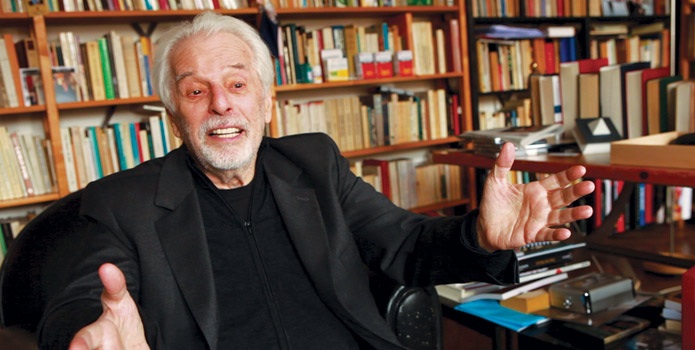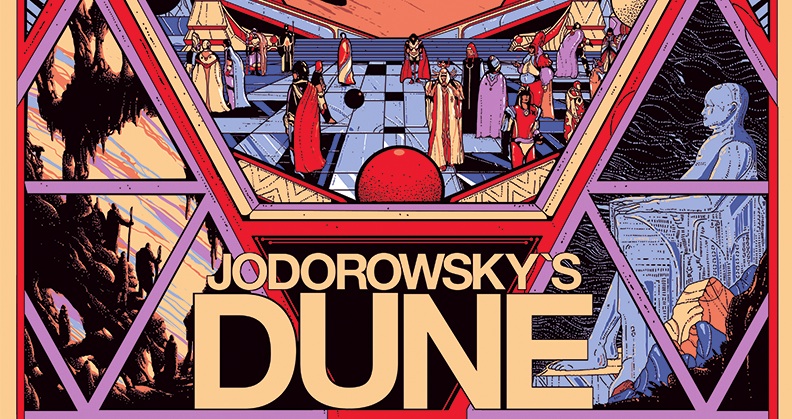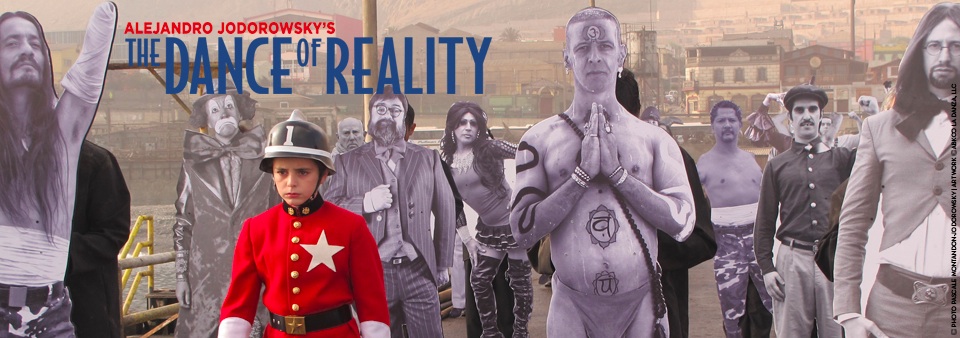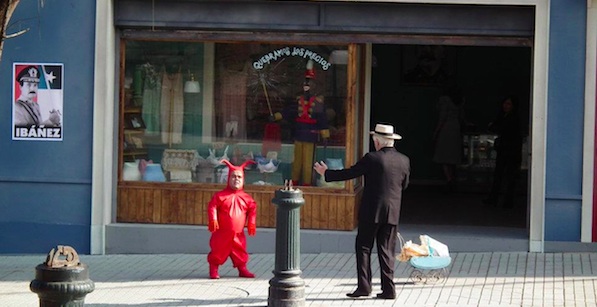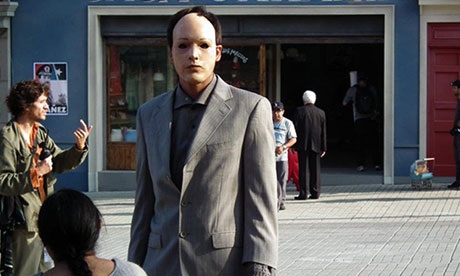The grandmaster of out-there cinema, Alejandro Jodorowsky, creator of several pieces of essential celluloid dreamscapes, El Topo, The Holy Mountain and Santa Sangre, lightens dark rooms in a big way this year. Frank Pavich’s documentary Jodorowsky’s Dune presents the surviving collaborators and exponents (H.R. Giger, Nicolas Winding Refn, Christian Vander of progressive rock band Magma—and more) of what could have been the greatest science-fiction film ever made, and the director’s first feature in over twenty years, The Dance of Reality. The Dune project was to have featured Salvador Dali, Orson Welles and Pink Floyd, enough to cause any cineaste or musicologist to froth at the mouth. Both films lauded at Cannes 2013, the impressive Pavich documentary has garnered unanimous praise and fans of the Chilean maestro’s presentation of artistic living eagerly await his latest baton-wielding. Now partnered with both Sony Classics and Abkco Films, Jodorowsky gave Keyframe some time on his 85th birthday to discuss the newest additions to his strong resume.
Keyframe: How did you get involved in Dune?
Alejandro Jodorowsky: I was in New York, I wanted really to go to make another picture, anywhere. I called Michel Seydoux, ‘I want to make a picture with you. What do you want to do?’ I had no idea what should be next. Then I remembered a fellow in Mexico who had said to me Dune was a fantastic book, ecological science fiction. I said, ‘I want to make Dune, but I didn’t read the book.’ Then I started to study the book, and realized it was not the book to make a picture from because it was so literary. I don’t have images from the book so then I start to create my own images and they were happy because it was a picture I’ll make.
Keyframe: As soon as you hear ‘Alejandro Jodorowsky, Pink Floyd, H.R. Giger’ you want to see this movie. You were determined to make this film. You even said you were ready to die making this film. How did Dune become so important to you?
Jodorowsky: I will tell you. I am an artist. I was born an artist. For me, art is the principal activity in my life. Fifty years ago today no one wanted to do something like that because movies are an industry. It is a business. Do it for two things: to sell cigarettes and to give the politics of the United States to the world. That is the role of the picture and to make a lot of money. Well, I didn’t want to do that. I express myself like an artist and I am still doing that. I was involved with Dune. Now I am involved in La Danza de la Realidad.
I say, ‘I am making a picture to lose money, not to win money.’ It’s the same. To be making art, to lose money. I shit in money. I want to do what I wanted to do. That is all. If they want money, I will make another picture. Please, I don’t want to be prisoner of an industry, of a producer, of stars, of all that shit. I want to make art, something that opens your mind.
Keyframe: In the documentary we see sections where the storyboards are animated. It’s wonderful to ‘what could have been’ in motion. Do you feel that it’s possible to create an almost animated version of what you had hoped for, using the storyboards that were created?
Jodorowsky: Yes, but I prefer not to do it because it’s better to dream than to have in reality a film not with Dali, not with Orson Welles. It’s different with drawings. I am not interested in that. If it’s dead, it’s dead. What we can do?
Keyframe: It’s interesting that you would go from something like Dune, which is this massive, cosmic project, to something like Tusk, was a much smaller film and a much simpler fable.
Jodorowsky: Listen, I have a family, four children. We need to eat. We have not any penny, no money. Then I need to make two pictures for money, not one. That was all for money. The Rainbow Thief was commercial, an industrial picture with stars. They start asking for a lot of things. There are big, big, big egos. It’s not art, it’s a pain, it’s terrible. It was very good for me to do that. It was an experience I needed to have.
Keyframe: Ridley Scott’s film Alien used a lot of the design work from Dune. How much of your Dune do you see in Alien?
Jodorowsky: It was principally Dan O’Bannon, who I was preparing Dune with. He used my team. He made a very good picture but not with the deep meaning as I wanted. He made an industrial picture. For me, when the person thinks of me I am happy because that means I have value. You know, you don’t steal something you don’t like, so they liked my picture and they take from my picture.
Keyframe: Did Orson Welles ever see your films?
Jodorowsky:No, I didn’t show him nothing because an artist like Orson Welles will like only Orson Welles. I would take him to the movies and he would speak about what he liked, but he would drink like an elephant. He liked to eat and to drink. All he would speak about is how to eat and how to drink. That is all.
Keyframe: And Salvador Dali?
Jodorowsky: Dali was with my surrealism. When he asked me for a contract. I wrote, ‘I want you to play in Dune, a card of the Tarot, card #12, The Hanged Man,’ and he was happy and then he wanted to work with me because we paid what he wanted.
He asked $100,000 per minute. I said, ‘OK, you want that for a minute—I’ll have you for one minute.’ Then I took care. I could with him; I could do it. It was not easy because I needed to be in New York and then in Paris and then in Barcelona. In the picture, you will see the person who was his muse, his inspiration, a transsexual person.
Keyframe: Although your Dune was not realized, do you feel some kind of positive change inside yourself?
Jodorowsky: Sure, I am not a person who is beaten. For me it was a fantastic experience. For two years of very hard work making art with really great artists and making a utopia—an illusion—I will do my best. It was fantastic. It changed my life and evidently, my mind. Incidentally, it was more of a spiritual mission. I have a goal inside myself.
Keyframe: Do you have other projects that came very close to being made?
Jodorowsky: Yes, Sons of El Topo. I wanted to make Sons of El Topo. It’s a fantastic picture. There are no other pictures like that. Now I am starting to make Sons of El Topo into a comic. I have a fantastic artist and I’m starting it this year.
Keyframe: And The Dance of Reality?
Jodorowsky: It’s my best book about my life. I decided to show the first chapter of that because I liked it. I wanted to do that as a film.
Keyframe: Have you met David Lynch?
Jodorowsky: Yes, a few years ago when I visited Lincoln Center, David came to a concert I was at to see me and were in each other’s arms for three minutes. We say nothing and then we say goodbye. I like him. I admire him as an artist. He’s an honest person in the industry of movies. Dune was a mistake but not because of him. It was the producers, the De Laurentiis family, who killed all the good directors they employed.
Keyframe: When Frank Pavich first approached you about making a documentary about Dune, how did you feel about revisiting the project?
Jodorowsky: He’s a very delicate and refined person. He spent some time at my house. I thought he was crazy. I like the crazy person. I said, ‘Yes, you’re crazy, what do you want?’ He said, ‘Tell me what you think about Dune.’ I said, ‘Come to my house three or four times and I will tell you everything.’ I never think he will make a documentary. He ask me, ‘Who? Why?’ For me, it was a fantastic experience and then I want to tell how he would describe what the experience was. I did it for my picture.
Frank’s a very, very beautiful person. I made my picture La Danza de la Realidad because he reintroduced me to Michel Seydoux, the producer of Dune. I thought Michel hated me because he lost a million dollars and because I made something too crazy for that time. He was happy with the project. He said to me, ‘Well, we have a compromise. Why don’t we make a picture now? I will do it.’
Keyframe: For many years of course it was really difficult to see El Topo and Holy Mountain, which are now available through Abkco. And today Abkco is releasing The Dance of Reality.
Jodorowsky: Listen, I read so much about wisdom in other countries and audiences in Japan, in Tibet, in China. I was thirty years fighting with Allen Klein. One day I called his son, Jody. I said, ‘Listen, I don’t want money. I want the people to see my picture. I am ready to demonstrate my picture for nothing and you open the picture. Why don’t you do that? Why fight like this?’
He said, ‘I will ask my father.’ He called me, ‘My father wants to see you in London.’ I went to see his father in London. He was the person I hated the most in the world. I said, ‘Why do we fight? We are box fighting!’ Then he opened the door after twenty years of not seeing me, he said to me, ‘Oh, but you are beautiful.’ I said to him, ‘Oh, you are not a gangster. You are like a spiritual master.’ In one minute, the fight was finished. We realized we lost a fantastic friendship, too.
Keyframe: And now the world gets to see the films with new transfers and they are available everywhere. You have the full support of Abkco. They love you.
Jodorowsky: And I love them.
Keyframe: I know you’re working on Sons of El Topo now as a graphic novel. If a producer came up with some money, would you still be interested in creating a film of the Sons of El Topo?
Jodorowsky: Yes, I can do it. It could be fantastic but in a different way. I would make it in a more emotional way now. I’ve changed. Every time with a picture I’m different because I am changing. I would make it different but that I would make it if the producer left me free to do whatever I want, but it is difficult.
Keyframe: If someone did get the materials and the rights for Tusk or Rainbow Thief, would you support either release? Do you feel there’s enough in either film to say this is a Jodorowsky film?
Jodorowsky: Tusk, yes. Tusk I am trying to find the negative because I want to edit the picture as I wanted. I want to remaster it and put a half hour back into the film and it will be a fantastic picture for children.
Keyframe: Have you found any of the materials for Tusk at this time or are they still lost?
Jodorowsky: No. I am searching because the producer died and the woman who had the materials is somewhere in Brazil. We’ll finish it if we find them. If I am alive I will do that. I’m at the age where the people involved will start to die.
Ah! My family is here for my birthday. I must go and be with them.
Keyframe: Muchas gracias, Alejandro! Happy birthday!

